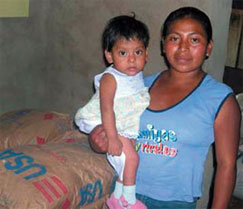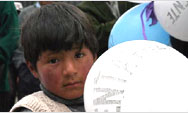Overview
 |
| |
“What motivates us are the children. There is a need in our community to better inform mothers about health care and nutrition. Thanks to USAID and the people of the United States, we can help others in our community. We are so grateful to USAID for this donation."
-
Iris Cálix is a Community Health Center Volunteer in Honduras. Read more...
|
|
 |
|
USAID's Work in Nutrition
Nutrition programs implemented by USAID and its partners have helped to decrease hunger and serious malnutrition rates throughout the developing world. It's estimated that 53 percent of deaths among pre-school children in the developing world are due to the underlying effects of malnutrition on diseases such as measles, pneumonia, and diarrhea. Three-quarters of the nearly seven million children who die each year of causes related to malnutrition are mildly to moderately malnourished. In addition, more than two billion people – mostly women and children – suffer from micronutrient deficiencies, most notably the lack of iron, zinc, vitamin A, and iodine.
Good nutrition can lead to an impressive range of benefits including improved survival, health, cognitive development, and work capacity. Conversely, undernutrition impairs the immunize response. As a result, poor nutrition increases the frequency, severity, duration and mortality of common childhood illnesses such as diarrhea, pneumonia, and measles. It also increases susceptibility to other infectious diseases such as malaria, tuberculosis and HIV/AIDS during complex emergencies.
USAID’s evidence-based nutrition programs work to improve the nutritional status of people in developing countries through a concentration in six areas: micronutrient supplementation and fortification, improved infant and young child feeding (IYCF), and measures to improve household food security and Title II food aid. USAID supports community-based approaches that build the capacity to monitor and improve children’s nutritional health through locally appropriate and effective community-based nutrition activities.
Currently, USAID-supported programs add vital micronutrients including zinc, vitamin A, iron, and iodine to processed foods such as rice and sugar. Moreover, USAID is improving the micronutrient content of basic foods by expanding research into supplementation and the development and dissemination of biofortified crops. This research includes investigation of vitamin A-, iron-, and zinc-enhanced maize; iron- and zinc-enhanced beans; and vitamin A-enhanced sweet potatoes. In 2005, USAID supported 22 food fortification programs with the potential to reach nearly 500 million people in 19 countries. Micronutrient supplementation and other USAID nutrition programs are integrated with other key lifesaving interventions (e.g., safe water, hygiene and sanitation) for maximum impact.
Nutrition Resources
|


